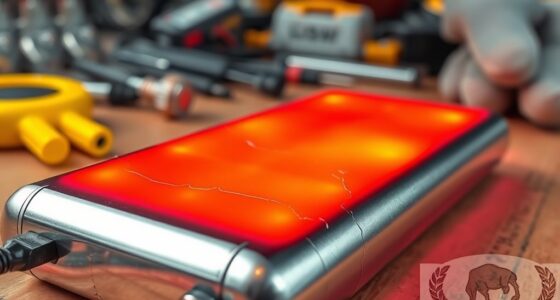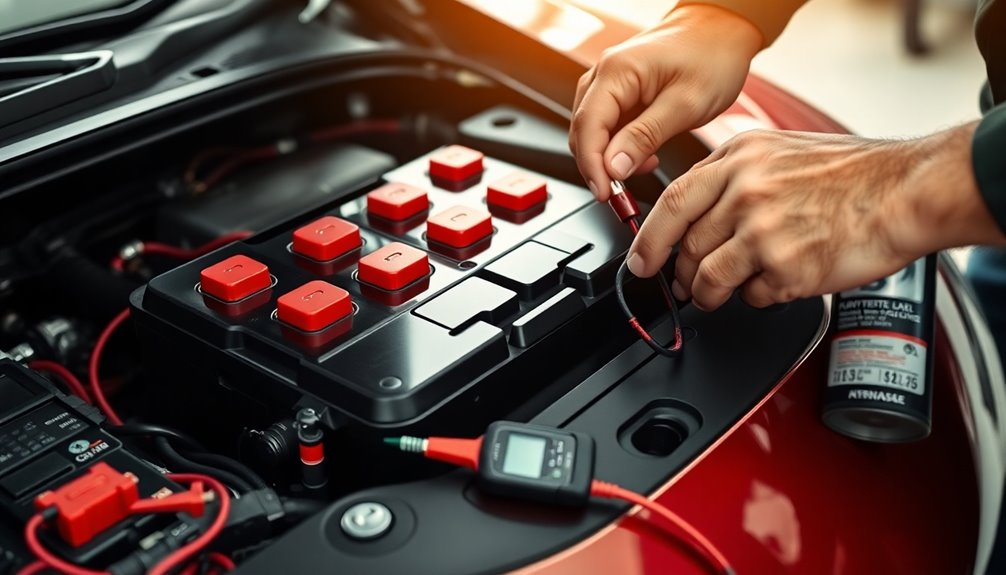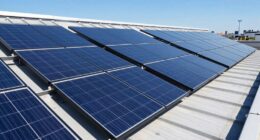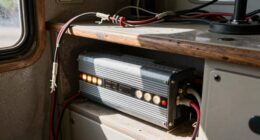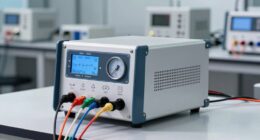Equalization charging is a proven maintenance technique, not just marketing hype. It helps keep your batteries balanced, extends their lifespan, and guarantees consistent performance. By applying a controlled, slightly higher voltage, it prevents issues like sulfation and voltage imbalances. While not necessary for all batteries all the time, when used properly, it offers real benefits. If you want to understand how to use equalization effectively and safely, there’s more to learn.
Key Takeaways
- Proper equalization improves battery health, but it’s not a universal cure-all; its effectiveness depends on battery type and condition.
- Not all chargers support equalization charging; using incompatible chargers can cause damage or reduce battery lifespan.
- Equalization helps prevent cell imbalances and sulfation, extending battery life when performed periodically as maintenance.
- Some claim equalization is marketing hype; however, when correctly applied, it offers tangible benefits for battery performance.
- Understanding your battery’s needs and using the right equipment is essential; improper use may harm the battery rather than help.
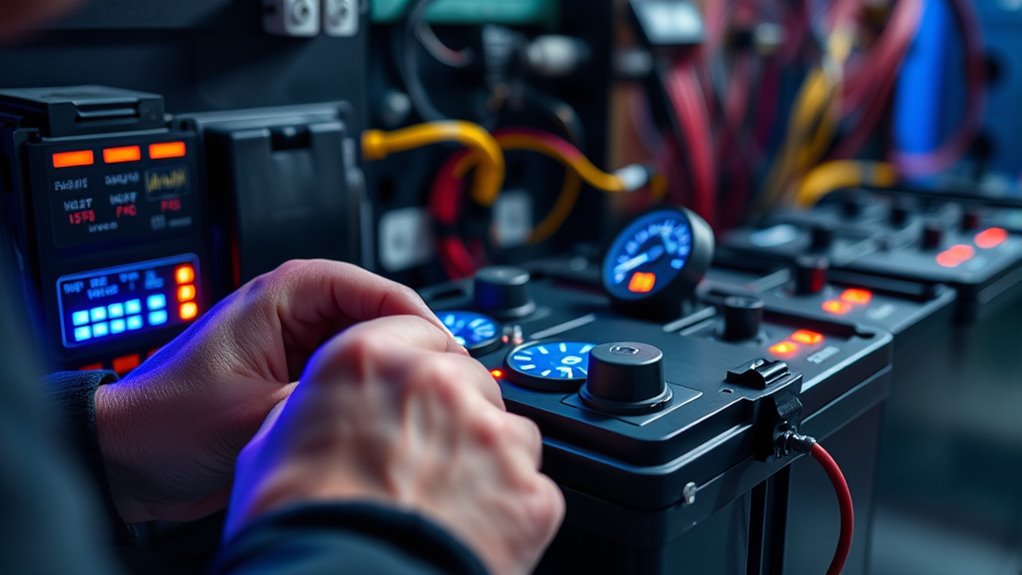
Have you ever wondered how to keep your battery pack balanced and performing at its best? One method often recommended is equalization charging, a process designed to guarantee that all cells within a battery stay in harmony. This technique can greatly impact your battery’s lifespan, helping it run efficiently for longer periods. However, before diving into equalization, it’s essential to understand the importance of charger compatibility. Not all chargers are built to handle equalization charging, and using the wrong one can do more harm than good. Many standard chargers lack the necessary features to safely perform this process, so checking whether your charger supports equalization is a key first step. When you use a compatible charger, you can confidently apply equalization to balance your cells, reducing the risk of overcharging or undercharging individual cells that can lead to premature battery failure.
In essence, equalization charging involves applying a controlled, slightly higher voltage to the entire battery pack to level out cell voltages. This process helps prevent issues like capacity loss, voltage imbalances, or sulfation—common culprits behind shortened battery life. When your cells are balanced, your battery can deliver consistent power, which not only extends its overall lifespan but also maintains peak performance. Keep in mind, though, that equalization isn’t a one-time fix; it’s a maintenance step best performed periodically, especially in deep-cycle batteries or those used frequently. Properly balanced cells mean fewer surprises, like unexpected drops in performance or sudden failures, saving you money and inconvenience down the line. Additionally, understanding how battery maintenance techniques work can help you optimize your charging routines and prolong your battery’s health.
Yet, some folks claim equalization is just marketing hype, designed to sell more specialized chargers or batteries. While it’s true that not every battery needs frequent equalization, dismissing it altogether ignores the real benefits it offers when applied correctly. The key lies in understanding your battery’s specific needs and ensuring your charger supports the process. If your charger isn’t compatible, attempting equalization could result in damage or reduced battery life. So, before you start, do your homework—read your battery’s manual, verify your charger’s capabilities, and consider whether equalization is appropriate for your particular application. When done properly, equalization can be a helpful tool to keep your battery healthy, but it’s not a cure-all or a marketing gimmick—just a well-understood technique that, when used correctly, can pay dividends in battery performance and longevity.
Frequently Asked Questions
How Often Should Equalization Charging Be Performed?
You should perform equalization charging based on your battery’s specific needs, typically every 4 to 8 weeks. Regular battery maintenance, including proper charging frequency, helps prevent sulfation and extends your battery’s lifespan. Always monitor your battery’s voltage and follow the manufacturer’s recommendations. If you notice uneven charging or capacity loss, it’s a good sign you need to perform an equalization charge sooner to maintain ideal performance.
Can Equalization Damage My Batteries?
You ask if equalization can damage your batteries. While proper battery maintenance and strict charging protocols help prevent harm, overdoing equalization can cause damage, especially if done too frequently or at incorrect settings. It’s essential to follow manufacturer recommendations and monitor your batteries during equalization. When used correctly, it boosts performance, but misuse or excessive equalization could lead to sulfation or overheating, damaging your batteries over time.
Is Equalization Necessary for All Battery Types?
Think of your batteries as delicate gardens needing careful tending. Equalization isn’t necessary for all battery types; it depends on your battery’s design. Proper battery maintenance and charging methods vary—flooded lead-acid batteries often benefit from equalization, while sealed AGM or gel batteries usually don’t. Check your manufacturer’s guidelines to avoid damage. Not every battery needs this process, so understanding your specific type keeps your system healthy and efficient.
What Signs Indicate the Need for Equalization Charging?
You should consider equalization charging if you notice uneven battery performance, such as reduced capacity or inconsistent voltages. These signs indicate your battery might need better maintenance through proper charging techniques. Regular equalization helps balance cell voltages and prevent sulfation. Keep an eye on specific gravity readings and overall battery health, and incorporate equalization into your battery maintenance routine when needed to extend lifespan and guarantee peak operation.
Does Equalization Extend Battery Lifespan Significantly?
You wonder if equalization extends your battery lifespan greatly. Proper battery maintenance and following correct charging protocols can improve performance and longevity. Equalization helps balance cell voltages, preventing sulfation and uneven wear. While it’s not a magic cure, regular equalization can enhance your battery’s overall health and lifespan, especially for deep-cycle batteries. Just make certain you use it correctly and don’t overdo it, as improper use might cause damage.
Conclusion
You might think equalization charging is a quick fix, but it’s more about optimizing your battery’s lifespan. Surprisingly, studies show that properly equalized batteries can last up to 20% longer, saving you money in the long run. Don’t fall for marketing hype—trust the data and sustain your batteries diligently. Implementing equalization charging isn’t just a gimmick; it’s a smart move to ensure your system stays reliable and efficient for years to come.



